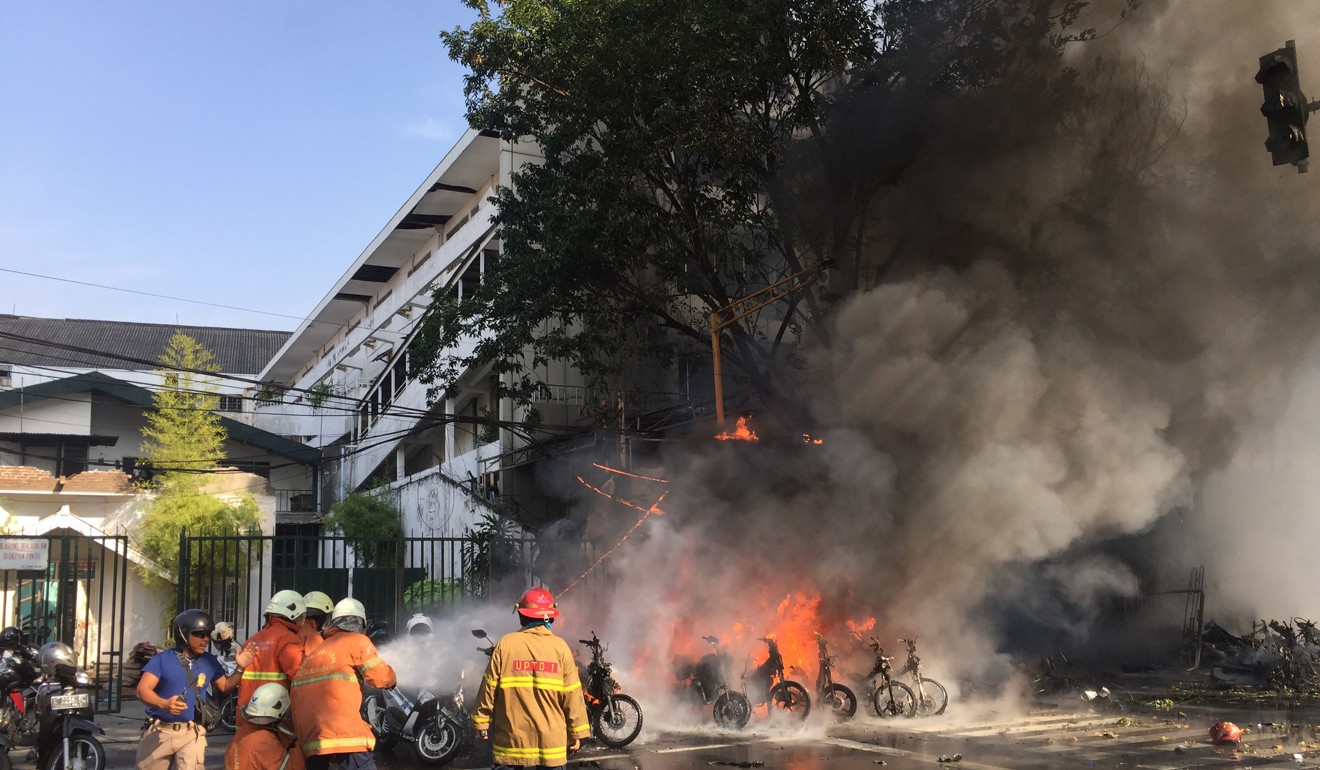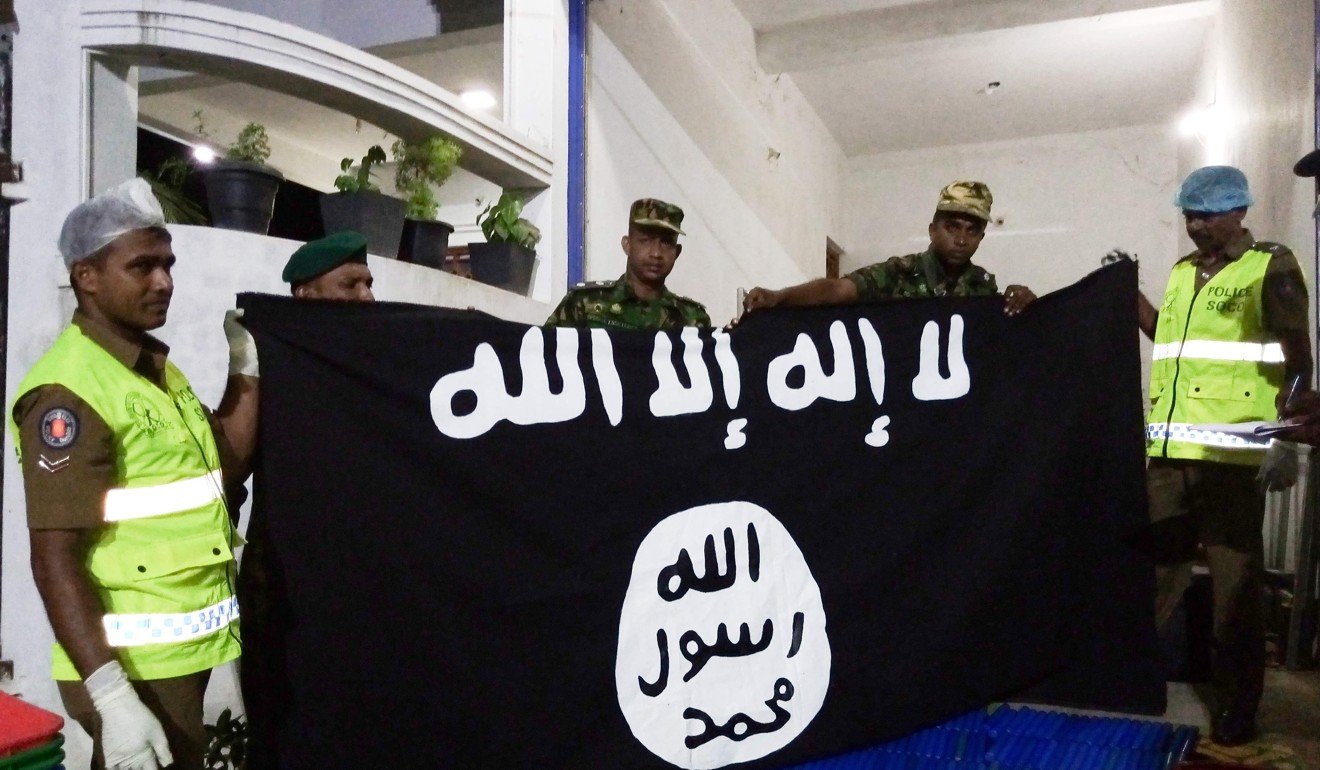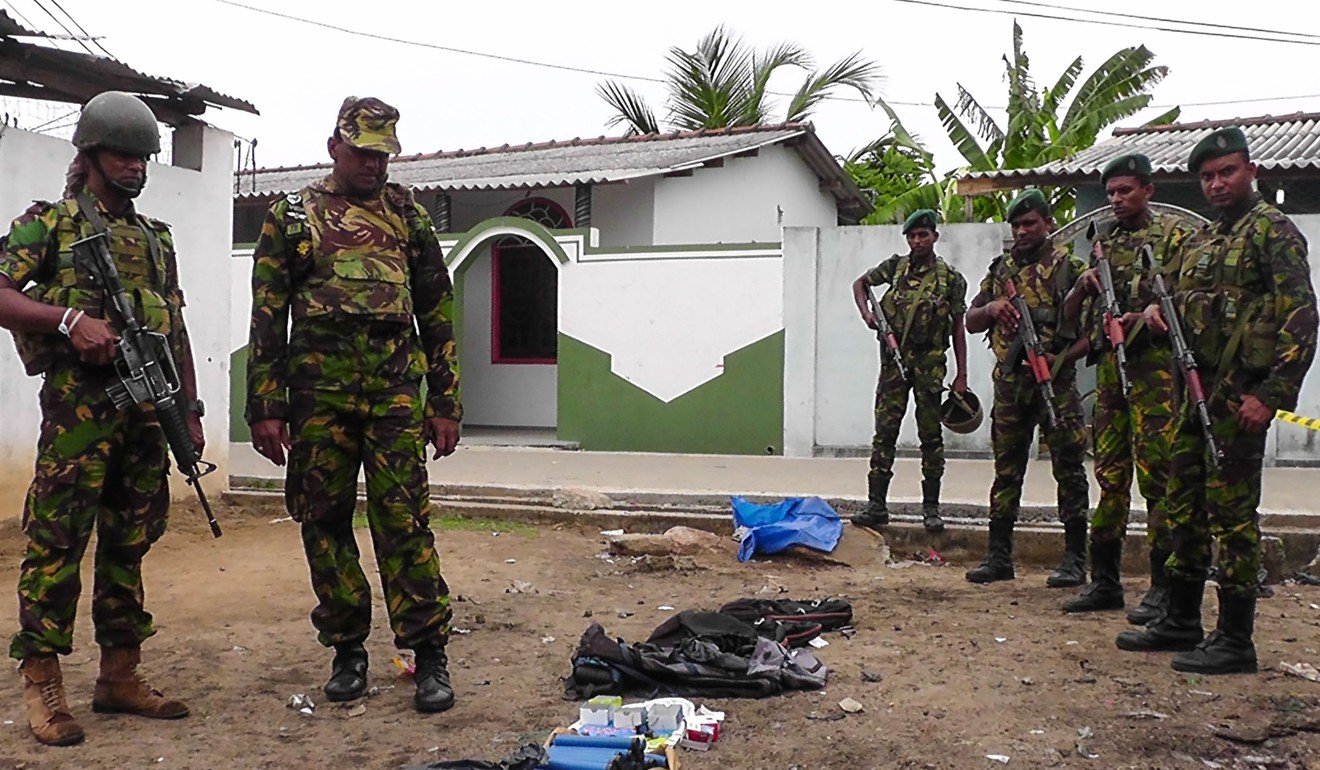
From Sri Lanka to Indonesia, more mothers are becoming suicide bombers – and killing their children too
- The deadly new phenomenon sees women radicalised by IS ideology taking their children’s lives and their own in pursuit of martyrdom
- Experts say the rise in the radicalisation of married couples is endangering entire families

As night fell on blood-soaked Sri Lanka following the carnage of Easter Sunday last month, police knocked on a door in an upscale neighbourhood – the home of two of the suicide bombers.
They were greeted by Fatima Ibrahim, the pregnant wife of bomber Ilham Ibrahim. On seeing the police, she ran inside and detonated an explosive device, killing herself, her unborn child and her three sons aged five, four and nine months. Three police officers also died in the blast.
In a similar case in March, anti-terror police arrested a suspected pro-Islamic State (IS) bomb-maker, Abu Hamzah, in Indonesia. When they went to his home to arrest his wife, Solimah, who had helped him make the bombs, she blew herself up, killing her two-year-old child.
From Sri Lanka to Indonesia, a deadly new phenomenon is emerging – women, radicalised by IS ideology, are killing themselves and their children in their pursuit of martyrdom.

Female suicide bombers have always featured in the annals of jihadism, going back to the Chechen Islamists in Russia known as Black Widows, but filicide by female radicals brings a dangerous new dimension to terrorism.
“We did not have this in al-Qaeda,” said Sofyan Tsauri, former member of al-Qaeda Southeast Asia. “In Islam, jihad for a woman is to take care of the household, nurturing and educating the children, not taking up arms.”
For these women, the maternal instinct to protect their children is supplanted by the quest for a “swift passage” into heaven, according to Nasir Abbas, a Malaysian former leader of the al-Qaeda-linked Jemaah Islamiah (JI) and once the most-wanted jihadist in Southeast Asia.
He later switched sides and is now involved in deradicalisation efforts and other initiatives to counter violent extremism in Indonesia.
In their twisted belief, they are convinced their children will also enter into heaven if they die with them
“These [female suicide bombers] believe protecting their children means protecting them from turning into infidels when they are gone,” he told This Week in Asia .
“In their twisted belief, they are convinced their children will also enter into heaven if they die with them [or] carry out the same act [of suicide bombing].”
A significant development pointing to this new phenomenon took place when a family of six bombed three churches in Surabaya in May 2018. The perpetrators were a father, mother and four children aged between nine and 18, according to Nasir and the Indonesian police.

The father, a wealthy businessman named Dita Oepriarto, strapped bombs on his wife and two daughters, who detonated them at a church. He made his two sons ride a motorbike laden with bombs into another church, where they blew themselves up.
Dita then drove his car, filled with explosives, into a third church. In the space of 10 minutes, the entire family was dead. Dita’s younger son, 16-year-old Firman Halim, was seen crying inconsolably during dawn prayers at a mosque some two hours before the attack.
They can be more dangerous as they are more willing to sacrifice, compared with men
“It is believed that the night before the bombings, the father told the children to prepare to die,” said Rizka Nurul, a researcher with the Institute for International Peace Building (IIPB), Indonesia’s first private deradicalisation organisation.
The rise in the radicalisation of married couples is proving to be a danger to the lives of their children.
“Children are in grave danger if both their parents are convinced that they must wage jihad … to atone for their sins in this lifetime by carrying out terror attacks,” said Nasir, the former JI leader. “The parents believe in bringing their children with them to heaven.”
Women are capable of being more radical and militant than men, according to researchers in the field of countering violent extremism.
“[This is] because women use their hearts. They can be more dangerous as they are more willing to sacrifice, compared with men who tend to be more rational as they consider costs and benefits,” said the IIPB’s Rizka.
Such was the case with Solimah, who blew herself up in her home following the arrest of her husband, Abu Hamzah. During interrogation, he told investigators his wife was much more radical than him.
The couple are believed to have been radicalised online by reading the teachings of Indonesia’s foremost IS ideologue, Aman Abdurrahman, who is currently on death row for inciting others to commit terror attacks in Indonesia.
Many of these women are believed to be radicalised by their husbands and accede to their teachings as a mark of obedience to their spouse.
“I am not surprised by [the suicide of the woman in the Sri Lanka blast] as she lives in a terrorist group’s environment,” said Any Rufaedah, lecturer in social psychology at Indonesia’s Nahdlatul Ulama Islamic University.
“In my prior research of wives of terrorists, most express obedience to their husbands. Only a small number of wives could reject the extreme ideology of their husbands, but they face consequences, for example, being separated from their husband,” she said. “Extremist groups require total obedience from the wife.”

In a chilling development, some radicalised Indonesian women are requesting a suicide vest as dowry from their husbands-to-be, according to former JI leader Nasir. “These women plan to carry out suicide bombings after they are married. Several of them have been arrested,” he said.
A counterterrorism official told This Week in Asia that a woman who requested such a vest was arrested in Klaten, Central Java, last March.

Countering this phenomenon requires both a soft and hard approach, according to Nasir. “The deviant teaching of terror networks needs to be [made] public. We need to have continuous deradicalisation and counter violent extremism programmes,” he said, adding that this would help dismantle terror networks and detain their members before attacks were carried out.
Indonesia through its National Counter-Terrorism Agency (BNPT) has established a deradicalisation programme for inmates, which works to rehabilitate their ideas about Islam through counter-narratives by religious leaders and psychologists, and equips them with skills they can use when they are eventually reintegrated into society. BNPT also focus on countering violent extremism on university campuses.
Analysts say getting former militant leaders to work with universities and the police in deradicalisation makes these programmes more effective, as they have unparalleled insight into the minds of attackers.
Another ex-JI member, Ali Fauzi, the younger brother of two executed Bali bombers, started his own NGO called the Circle of Peace, which is deeply involved in countering violent extremism and deradicalisation.
Women must now be a specific focus of these programmes and other community efforts to prevent radicalisation, analysts say.
A recent Institute for Policy Analysis of Conflict (IPAC) report called for more women to be recruited by Indonesia’s counterterrorism police squad, Detachment 88, given the increasing number of female militants.
“The percentage of women in the police generally remains woefully low, just over 8 per cent,” it said.
Better programmes are also needed for pro-IS female detainees. There are currently 15 such women in detention, some of whom were involved in violence. According to IPAC, understanding the backgrounds and motivations of these women is essential for a more targeted rehabilitation programme.
“IS may have reluctantly accepted women as combatants, but they are now encouraged to take part in operations,” the report said. “It is easy to dismiss the competence of Indonesian terrorists, but as long as they continue to subscribe to IS ideology, they remain a serious threat.” ■